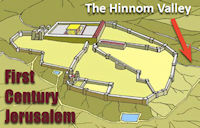We hear a lot about Hell, but there is still much confusion about what it is and where it is located. In some religions it is the location of the afterlife, where the souls of evil people are subjected to suffering through torture and eternal punishment, usually for sins committed sometime in their lives.
But a few religions describe Hell only as the abode of the dead or their grave. And others indicate it is a place that is located far below the surface of Earth, and such places — sometimes named Hades or Sheol — can be best described as the underworld.1 You may think all this seems rather confusing, and it is. Most people just follow the belief of their preferred church denomination, but one thing for sure is that a large number don’t really believe in its existence at all.
Listen to this article: Click the > button to start audio – click again to pause – click the speaker icon to mute. Adjust volume on the right side.
If you look up ‘Hell’ in a secular dictionary, you get definitions such as “a spiritual realm of evil and suffering” or “a place of perpetual fire beneath the earth to which the wicked are sent after death.”2 And Jehovah’s Witnesses have a reasonable answer as to why some people believe Hell is only a grave or shallow place within the earth that is covered up. Their encyclopedia makes the following comment. The word Hell “originally conveyed no thought of heat or torment but simply of a ‘covered over or concealed place’. In the old English dialect the expression ‘helling potatoes’ meant, not to roast them, but simply to place the potatoes in the ground or in a cellar.”3
While there may be some slivers of truth reflected from most such explanations, they do not accurately describe Hell from the true biblical perspective. All the above thoughts reflect fairly recent attitudes and beliefs, but the true biblical view sometimes reflects a world of weird and outlandish ideas — a ‘bizarro’ world — where the wrong belief may be more plausible to many people than what is true.
What is the real Hell? Where is it located?
This is all interesting, but let’s now examine the facts about this word. ‘Hell’ is incorrectly derived from the Greek word geenna (or Gehenna) which represents the Hebrew Ge-Hinnom or Valley of Hinnom, the ancient location of a shrine in Tophet,4 a place of burning. Reference of it is found twelve times in the New Testament and one example of its use is in the book of Matthew where Jesus teaches the following.
 “You have heard that it was said to those of ancient times, ‘You shall not murder’; and ‘whoever murders shall be liable to judgment.’ But I say to you that if you are angry with a brother or sister, you will be liable to judgment; and if you insult a brother or sister, you will be liable to the council; and if you say, ‘You fool,’ you will be liable to the hell of fire” (Matthew 5:21-22, NRSV).5
“You have heard that it was said to those of ancient times, ‘You shall not murder’; and ‘whoever murders shall be liable to judgment.’ But I say to you that if you are angry with a brother or sister, you will be liable to judgment; and if you insult a brother or sister, you will be liable to the council; and if you say, ‘You fool,’ you will be liable to the hell of fire” (Matthew 5:21-22, NRSV).5
Those are very descriptive words and I can imagine a typical ‘hellfire and brimstone’ preacher holding his Bible open with one hand and pointing his finger at me with the other. I picture him stomping around and yelling, “You better get right with God or your sinful ways will only get you a place in Hell!” Fortunately, that is not what Jesus meant.
In the above scripture, Christ was contrasting the traditional ancient understanding of the Mosaic Law with the truer sense of which he understood and preached. The Valley of Hinnom in the Tophet region of Jerusalem, was where ancient human sacrifices were once performed to the pagan god Moloch (see Jeremiah 7:31). “Over time, Gehenna came to represent a place of God’s wrath, hence the affiliation with fire.”6
This teaching from our Lord was to love our brothers and sisters and we are obligated toward reconciliation of any complaint. To be irrationally stubborn may lead to unrealized problems and unnecessary punishment. Jesus was not speaking literally, but using deliberate exaggerations to make a point.7 And my own point in using this example is to show that much personal thought must be given to understand the word ‘hell’ as used in the Bible.
 So, remember that when the New Testament references Hell, it should be properly related to the Hebrew place-name Gehenna, meaning the Valley of Hinnom. This valley south of Jerusalem (now sometimes called by other names) once was the ancient place of child sacrifices to the god Moloch.8 “The Jews later used this valley for dumping refuse, dead bodies of animals, and executed criminals. The continuing fires of this garbage dump led the people to begin using the name for a place where the wicked dead suffer.”9
So, remember that when the New Testament references Hell, it should be properly related to the Hebrew place-name Gehenna, meaning the Valley of Hinnom. This valley south of Jerusalem (now sometimes called by other names) once was the ancient place of child sacrifices to the god Moloch.8 “The Jews later used this valley for dumping refuse, dead bodies of animals, and executed criminals. The continuing fires of this garbage dump led the people to begin using the name for a place where the wicked dead suffer.”9
Other Words Describing Hell
But there are other words that are sometimes inaccurately translated as ‘Hell’ in some versions of the Bible, especially in the Old Testament. They are Hades, Sheol, and Tartarus.
Hades was the invisible Greek god of the dead and king of the underworld.10 To the Greeks, this underworld was a distinct realm where an individual goes after death, when their essence (or psyche) is separated from the corpse and then transported to this infernal region. This belief is part of Greek mythology, not Christian doctrine. It has been made most popular by classical literature, not the Bible.11
Sheol is the Old Testament term for the Hebrew place of the dead. To be more specific, it was the place of the unrighteous dead. In many texts persons are spoken of as descending to Sheol or of going into a pit (Psalm 88:6, 10; Amos 9:2). This likely indicates that the Hebrews saw Sheol as something beneath their feet. The King James Version of the Bible often translated it as ‘Hell’.12
 Later, many Jews viewed Sheol as a secured family grave on a large scale, where the human remains could have communion with other members of their clan. Generally, although Sheol is described as subterranean, it “is but an application of the custom of hewing out of the rocks passages, leading downward, for burial purposes.”13
Later, many Jews viewed Sheol as a secured family grave on a large scale, where the human remains could have communion with other members of their clan. Generally, although Sheol is described as subterranean, it “is but an application of the custom of hewing out of the rocks passages, leading downward, for burial purposes.”13
Tartarus originally referred to the deepest region of the underworld, where the gods locked up their nonhuman enemies. It was likewise part of Greek mythology and also mentioned by Plato (c. 400 BC). This place gradually came to mean the entire underworld.14
But although early Christians did not believe in Greek mythology, the idea of Tartarus was a concept close to their understanding and adapted the term to explain the underworld taught in scripture. This made it easier for non-Jews to grasp the idea of where demons lived. With these thoughts in mind, I offer scripture containing the word Tartarus (Hell) which is one of the more problematic verses in the Christian Bible; it is found in the book of Second Peter.
“For if God did not spare the angels when they sinned, but cast them into hell and committed them to chains of deepest darkness to be kept until the judgment . . . then the Lord knows how to rescue the godly from trial, and to keep the unrighteous under punishment until the day of judgment” (2 Peter 2:4, 9).
This same verse reads quite differently in a literal and modern translation from the original language of the Messianic writings (New Testament). It states as follows.
“For if Elohim did not spare the messengers who sinned, but sent them to Tartaros, and delivered them into chains of darkness, to be kept for judgment . . . then יהוה [God, YHWH, Jesus] knows how to rescue the reverent ones from trial and to keep the unrighteous unto the day of judgment, to be punished” (2 Peter 2:4, 9, The Scriptures).15
 To fully understand this meaning, we must journey back to the book of Genesis and the fallen angels and the days of Noah. “Elohim” constitutes the Divine Council of God, and the “messengers who sinned” are the fallen angels. The phrase “sent them to Tartaros” means sent to the underworld, and “chains of darkness” indicates imprisonment. The “day of judgment” means at the conclusion of this age.16
To fully understand this meaning, we must journey back to the book of Genesis and the fallen angels and the days of Noah. “Elohim” constitutes the Divine Council of God, and the “messengers who sinned” are the fallen angels. The phrase “sent them to Tartaros” means sent to the underworld, and “chains of darkness” indicates imprisonment. The “day of judgment” means at the conclusion of this age.16
Basically, those nonhuman entities responsible for the chaos caused before the flood of Noah have been imprisoned within the depths of the earth, awaiting their day of judgement. Human spirits do not occupy this realm, although this is the place most people visualize as ‘Hell’. What the Bible actually teaches about human death is that our spirit is ‘asleep’ until we are resurrected, hence the term ‘rest in peace’. A couple of studies have been published about human death. They are listed in References & Notes.17
To learn more about the mentioned council of God, see the article “What is God’s Divine Council?” listed in References & Notes.18 To further clarify who these nonhuman entities are, see the article “What are Demons and the Nephilim? — and that Mayhem before the Flood of Noah” also listed in References & Notes at the end of this study.19 Both those treatises have many references that will lead you down a rabbit hole filled with strange and esoteric knowledge on the fringe of belief.
Could this underworld actually be true?
Do you think demons are just figments of peoples’ imagination or believed only by an uneducated populace? Most people think that way, but nowhere in the Bible does it say this underworld of imprisoned evil spirit creatures is false. We are told, however, to stay away from such things.
Jesus even demonstrated the truth about demons through a personal experience. Remember the story of Jesus calming a storm on the sea? Well, it is right after that event, when Jesus and those with him came ashore (Mark 4:36) in the region of the Gadarenes, where he met a naked demon-possessed man, who lived among the tombs of the area’s graveyard. Being a fierce man, he had been previously bound many times with shackles and chains of which he would shatter to pieces.
 “These tombs were caverns, in the sides of the rocks, containing cells in which the dead bodies were placed and closed up.” The entrances to some caves were not sealed on the outside, but had an access separate from the burial chamber, that could have been used as the man’s home. These kinds of tombs are still visible today in the outlying areas of the cities in the region.20
“These tombs were caverns, in the sides of the rocks, containing cells in which the dead bodies were placed and closed up.” The entrances to some caves were not sealed on the outside, but had an access separate from the burial chamber, that could have been used as the man’s home. These kinds of tombs are still visible today in the outlying areas of the cities in the region.20
The man is described as a pathetic outcast; shrieking wildly and cutting himself with sharp stones, showing “that demon possession is not mere sickness or insanity but a desperate satanic attempt to distort and destroy God’s image in man.”21
Jesus commanded of the demon, “Come out of the man, you unclean spirit!” (Mark 5:8). Kneeling before Jesus and speaking through the possessed man, the demon asked, “What have you to do with me, Jesus, Son of the Most High God? I beg you, do not torment me.” (Luke 8:28). Jesus asked the demon, “What is your name?” He replied, “My name is Legion; for we are many” (Mark 5:9), and he begged not to be sent back into the abyss.
Noteworthy is that the demon recognized who Jesus was (Mark 5:6), and knelt down before Jesus, not as an act of worship, but out of respect or homage to one of a higher power. And the question was raised, “What have you to do with me?” which is an expression meaning “what have I done to you that you should do this to me?”22
The demon (and his associates) then entered some pigs who soon died and the demonic spirits, assumedly, returned back to the underworld, because such spirits cannot die. Being created on this planet before the flood, demons are restricted to earth. Originally, after they sinned, they were sent to the underworld (Tartarus or Hell), thus imprisoned until the judgement day. You can read the full story in “Demons, Jesus, and the Pigs” which is linked in References & Notes.23
There is only one way demonic spirits can escape this darkness of the underworld and have some freedom of movement, it is to possess or occupy a host body. One author wrote, “Demons seek to possess bodies and they seem rather uncomfortable being outside of them. From Scripture, we see that both fallen angels and holy angels have bodies. In contrast, demons greatly desire bodies because they do not have them. Demons are clingy, needy, angry, tormented creatures. That is the first distinction between fallen angels and demons.”24
The demons and the fallen angels who created them are restricted to the earth. “God did not spare the angels when they sinned, but cast them into hell [Tartarus or the underworld], and commit them to chains of deepest darkness to be kept until judgment,” (2 Peter 2:4). As for the demons, except for visits of short duration upon the surface, or extended visits in a possessed body, they are now kept in darkness with the fallen angels, concealed away within the earth, until the end of this age (also see Jude 6).
While human spirits do not live in Hell, there is biblical evidence that Jesus visited the imprisoned spirits living there. The Apostles’ Creed (4th century) was borrowed from the Gospels’ account of our Lord’s life and is now used in Roman Catholic, Anglican, Presbyterian, Methodist (and some other) organizations. Part of that text states that Jesus “ . . . was crucified, died and was buried; he descended into hell; on the third day he rose again from the dead. . . .” The following is taken from the book of First Peter, of which the following is quoted (emphasis is mine).
“For Christ also suffered for sins once for all, the righteous for the unrighteous, in order to bring you to God. He was put to death in the flesh, but made alive in the spirit, in which also he went and made a proclamation to the spirits in prison, who in former times did not obey, when God waited patiently in the days of Noah, during the building of the ark, in which a few, that is, eight persons, were saved through water” (1 Peter 3:18-20).
 ‘Hell’ in the Apostles’ Creed should be translated as the underworld, which does fit within Christian thought. This thought has not been spoken of much on the public side of the Church, because it is so unbelievable, especially to those who only sit and listen, instead of studying the deeper meaning of scripture. But its subject matter is beginning to pierce the veil of secrecy and you will find increasing amounts of literature available.
‘Hell’ in the Apostles’ Creed should be translated as the underworld, which does fit within Christian thought. This thought has not been spoken of much on the public side of the Church, because it is so unbelievable, especially to those who only sit and listen, instead of studying the deeper meaning of scripture. But its subject matter is beginning to pierce the veil of secrecy and you will find increasing amounts of literature available.
Jesus went to the underworld to proclaim, which is from the Greek word meaning to preach divine truth.25 This suggests he went down to the imprisoned spirits to announce that he had salvaged the human race from destruction. He had successfully redeemed humankind from the sin handed down to them through Adam.26 For an article on the Apostles’ Creed, see References & Notes.27
How does this underworld realm affect us? What can we do?
 This demonic realm can affect us only if we allow it to do so. Foremost, we shouldn’t put ourselves in such a position that it can. We should not associate with those who live in an ungodly manner, those who may already be possessed or influenced by evil forces. We should live our lives and be guided by expressing God’s Holy Spirit and associate with others who do the same. The apostle Paul gives us examples of loving acts and attitudes, those he terms the ‘Fruit of the Spirit’. He said, “The fruit of the Spirit is love, joy, peace, patience, kindness, generosity, faithfulness, gentleness, and self-control,” (Galatians 5:22-23a).
This demonic realm can affect us only if we allow it to do so. Foremost, we shouldn’t put ourselves in such a position that it can. We should not associate with those who live in an ungodly manner, those who may already be possessed or influenced by evil forces. We should live our lives and be guided by expressing God’s Holy Spirit and associate with others who do the same. The apostle Paul gives us examples of loving acts and attitudes, those he terms the ‘Fruit of the Spirit’. He said, “The fruit of the Spirit is love, joy, peace, patience, kindness, generosity, faithfulness, gentleness, and self-control,” (Galatians 5:22-23a).
Paul also gives evidence of those attributes that do not express God’s spirit. Those that emulate evil characteristics express an opposite outlook, one that he terms ‘works of the flesh’. “Now the works of the flesh are obvious: fornication, impurity, licentiousness, idolatry, sorcery, enmities, strife, jealousy, anger, quarrels, dissensions, factions, envy, drunkenness, carousing, and things like these. I am warning you, as I warned you before: those who do such things will not inherit the kingdom of God” (Galatians 5:19-21).
These are the qualities of people that could be either demon-possessed, or satanically influenced. Either way, we should separate ourselves from them. The evil and demonic spirits are the enemies of God, and they lurk behind humans using us as tools in their battle for control of this world.28
Conclusion
Okay! I had difficulty finding a music video that was anywhere near appropriate to this study on Hell, at least in relation to the biblical use of the word. But, let’s see if I can segue into a song by using a more extreme connection.
The song selected is not about demons or Hell, but it is about Jesus at the moment of death, just before his spirit descended to visit the demonic spirits in Hell. The gospel artist is Larry Ford performing “Then He Bowed His Head and Died” at David’s Cathedral in Jerusalem, Israel in 2005. Selected lyrics are listed below and the music video is linked in References & Notes.29
 From Eden to Golgotha’s hill
From Eden to Golgotha’s hill
All across the sands of time.
Came love just to buy back fallen man
God’s Son would have to die;
Yes, To die. . .
A shout split history in two
And it echoed through the skies.
Oh, the Father, the Father heard,
All heaven heard, “Thy will tis done!”
Then He bowed His head and died.
![]()
Copyright © 2023, Dr. Ray Hermann
OutlawBibleStudent.org
→ Leave comments at the end, after ‘References & Notes’.
Your email address will NOT be published. You can view our basic rules for comments by clicking “The Fine Print” on the top menu bar.
References & Notes
- “Hell”, (Wikipedia, Wikimedia Foundation, 12 March 2023), https://en.wikipedia.org/wiki/Hell
- Concise Oxford English Dictionary, 11th ed., (USA: Oxford University Press, 2008 [revised]).
- “Hell” in Insight on the Scriptures, (New York: Watchtower Bible and Tract Society, 1988), vol. 1, pp. 1086-1087.
- Vine, W. E., Vine’s Complete Expository Dictionary of Old and New Testament Words, (Nashville, TN: Thomas Nelson Publishers, 1996), ‘Hell’.
- Unless otherwise mentioned, all scripture is taken from The Holy Bible: New Revised Standard Version, (Nashville: Thomas Nelson Publishers, 1989). Used with permission.
- Barry, John D., et al., Faithlife Study Bible, (Bellingham, WA: Lexham Press, 2012, 2016), [Matthew 5:22].
- Ibid., [Matthew 5:29-30].
- Hermann, Ray, “Abortion and Sacrificing Children to Moloch: A Bible Study”, (The Outlaw Bible Student, OBS, 27 June 2022), https://outlawbiblestudent.org/abortion-and-sacrificing-children-to-moloch-a-bible-study/
- Brand, Chad, et al., (Eds.), Holman Illustrated Bible Dictionary, (Nashville, TN: Holman Reference, 2003), p. 631.
- Jordan, Michael, Encyclopedia of Gods, (New York: Facts on File, Inc., 1993), p. 92.
- “Greek underworld”, (Wikipedia, Wikimedia Foundation, 10 April 2023), https://en.wikipedia.org/wiki/Greek_underworld
- Brand, Chad, et al., (Eds.), Holman Illustrated Bible Dictionary, (Nashville, TN: Holman Reference, 2003), pp. 1482-1483.
- Singer, Isidore, (Ed.), Jewish Encyclopedia, (New York: Funk and Wagnalls Company, 1906), vol. 11, p.282.
- “Tartarus: Greek mythology”, (Encyclopaedia Britannica, 23 June 1999), https://www.britannica.com/topic/Tartarus
- The Scriptures, 3rd ed., (Northriding, S. Africa: Institute for Scripture Research, 2009).
- Bercot, David W., A Dictionary of Early Christian Beliefs, (Peabody, MA: Hendrickson Publishers, 1998), p. 637.
- OBS studies about death:
(1) “Our Future After Death — Resurrection on Earth or Life in Heaven?” https://outlawbiblestudent.org/our-future-after-death-resurrection-on-earth-or-life-in-heaven/
(2) “Do we go to Heaven when we die? Do people see Heaven during a Near Death Experience?” https://outlawbiblestudent.org/do-we-go-to-heaven-when-we-die-do-people-see-heaven-during-a-near-death-experience/ - Hermann, Ray, “What is God’s Divine Council?” (The Outlaw Bible Student, OBS, 20 March 2023), https://outlawbiblestudent.org/what-is-gods-divine-council/
- Hermann, Ray, “What are Demons and the Nephilim? — and that Mayhem before the Flood of Noah?” (The Outlaw Bible Student, OBS, 29 October 2019), https://outlawbiblestudent.org/what-are-demons-and-the-nephilim-and-that-mayhem-before-the-flood-of-noah/
- Exell, Joseph S., The Biblical Illustrator: St. Mark, (London: James Nisbet & Co., n.d. [about 1905]), p. 189.
- Grassmick, John D., “Mark,” in The Bible Knowledge Commentary: An Exposition of the Scriptures, J. F. Walvoord and R. B. Zuck, (Eds.), (Wheaton, IL: Victor Books, 1985), vol. 2, p. 122-123.
- The NET Bible First Edition Notes, (Richardson, TX: Biblical Studies Press, 2006), Matthew 8:29.
- Hermann, Ray, “Demons, Jesus, and the Pigs”, (The Outlaw Bible Student, OBS, 13 August 2019), https://outlawbiblestudent.org/demons-jesus-and-the-pigs/
- Hernandez, David Diga, “3 Subtle Distinctions Between Demons and Fallen Angels,” (Charisma News, 30 July 2016), https://www.charismanews.com/opinion/58898-3-subtle-distinctions-between-demons-and-fallen-angels
- proclaim: Strong’s Greek #2784, κηρύσσω (kērussō); to herald (as in public), especially divine truth (the Gospel) – preach, publish.
Strong, James, The New Strong’s Dictionary of Hebrew and Greek Words, (Nashville: Thomas Nelson, 1996). - Hornik, Heidi J., and Parsons, Mikael C., “The Harrowing of Hell,” (Bible Review, June 2003), vol. 19, no. 3, p. 18.
- Hermann, Ray, “The Apostles’ Creed — Why does it say Jesus Descended into Hell?” (The Outlaw Bible Student, OBS, 16 March 2020), https://outlawbiblestudent.org/the-apostles-creed-why-does-it-say-jesus-descended-into-hell/
- Hermann, Ray, “Ephesians 6: Evil Cosmic Powers & the Armor of God”, (The Outlaw Bible Student, OBS, 17 February 2019), https://outlawbiblestudent.org/ephesians-6-evil-cosmic-powers-the-armor-of-god/
- “Then He Bowed His Head and Died”, Artist: Larry Ford and the Gaither Vocal Band; recorded live in Jerusalem, Israel, 2005, (copyright Gaither Music Group, no licensing info listed). Used under ‘fair use copyright’ for teaching under Section 107 of the United States Copyright Act of 1976 — MUSIC VIDEO: https://youtu.be/-qXm8bTgXVw


In Jeremiah 7: 31 after condemning the Israelites for sacrificing their children in the fire to Molech, he states that such a thought would “not even come up into his heart.” It seems to me that people suffering eternally in a fiery hell forever is not something that He dreamed up….sounds more like disgruntled people who want others to suffer…sounds like an idea that Satan would cook up….
That is an interesting though! Thanks for sharing.
I think the question most will have after reading this is: is there a Hell for unbelieving human spirits after death? That’s what most have been taught and believe (myself included). But there is a lot of dialog occurring lately that seems to suggest that Christians are misinformed. You didn’t come out and address this (unless I overlooked it). What do you believe Scripture reveals about Hell in this respect?
Thanks for the comment and question. In answer to your query, no, I do not believe there is a special Hell for unbelieving human spirits; they will be resurrected from sleep, also. This is my opinion and everyone has the free choice to believe or not. I feel my job is only to present information, not to demand a change of heart. Anyway, consider the following scripture.
“Don’t be so surprised! Indeed, the time is coming when all the dead in their graves will hear the voice of God’s Son, and they will rise again. Those who have done good will rise to experience eternal life, and those who have continued in evil will rise to experience judgment” (John 5:28-29, New Living Translation).
Our God is a loving God, so he is not motivated in having eternal punishment cast upon those who are making decisions while living in an imperfect evil world. Most (but probably not all) will be given another chance. It is reasonable to believe they will have to make measured positive changes in their lives to meet the requirements of receiving everlasting life. And what if they don’t? They will die and that will be the end of them. Their eternal punishment will be everlasting death; they will then be non-existent.
The main difference in trying to meet God’s standards for achieving everlasting life for those that didn’t meet the standard in this evil world, is that in the new age to come, Satan’s influence will have been removed. This is a quick overview. It is difficult to give a full explanation in just a few paragraphs. Maybe I can do an article on this subject at some time in the future.
This is so well written and has cleared up so much for me. I’ll be reading all of the associated articles tomorrow that I haven’t read yet. “Hell” is such a confusing idea and when reading the scriptures, I will admit that I have questioned its existence back and forth so much lately. Thank you for all of your hard work and research. You’re truly doing the good works in this crazy world. Praying for you!
Thank you reading this article and taking the time to comment. I am very happy that this study has been helpful in sorting out your own thoughts on the subject. And your gracious words are appreciated, too.